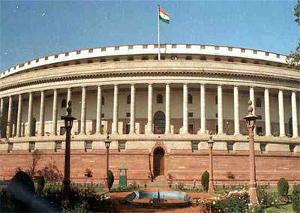
NEW DELHI: The possibility of a government push for passage of the land acquisition bill in the forthcoming monsoon session of Parliament seems to be receding with the parliamentary committee set up to examine the contentious legislation seeking extension.
At Monday’s meeting of the panel, chairman S S Ahluwalia is learnt to have suggested that Speaker Sumitra Mahajan be asked for an extension of the panel’s tenure on the ground that it was yet to receive response of all state governments. Indeed, Congress members on the panel — Digvijay Singh, Jairam Ramesh and others — asked for a three-week extension.
The delay will be a setback to the government’s plan to steer the legislation, already much-delayed, towards early passage. The monsoon session will be a short one, limited to just three weeks. With the opposition already on the warpath over ‘Lalitgate’, delayed clearance by the parliamentary committee will result in shrinkage of the window for the bill to put to vote in the two Houses.
The parliamentary committee on land bill was conceived as a device to help the government secure passage of the bill, by convening a joint sitting of the two Houses if that becomes necessary. The option of holding a joint session has tempted BJP managers as it can allow the government, keen as it is on changing the land acquisition law enacted under UPA, to use its superior numbers in Lok Sabha to overcome its numerical handicap in Rajya Sabha.
Congress has been determined to deny the route to government by pressing for the legislation to be sent to a select committee where it can languish indefinitely and, thus, be kept from being put to vote. For the government to be able to exercise the option of convening a joint sitting for the passage of a bill, the particular piece of legislation is required to have been voted upon in both Houses.
The parliamentary committee, in contrast, is expected to submit its report before the monsoon session gets over, thus clearing the way for a vote to be taken on the bill. While the legislation is certain to be defeated in RS, government will not grieve over the defeat because it opens up the vista for a joint sitting.
The meeting of the panel saw Trinamool Congress members arguing that since most of those who have deposed before the panel have disagreed with clauses of the bill in the present form, the government should withdraw the bill. According to a member, out of the 44 people who have been heard at the nine meetings of the panel, at best two have agreed with the bill and the rest have opposed it.
Reacting to that, Congress members Digvijay Singh and Jairam Ramesh said in that case, even they would want the bill to be withdrawn.
The meeting also saw agriculture institutes and think tanks pressing for the need to “first acquire wasteland and use cultivable land as a last resort”. Representatives from Indian Council for Agriculture Research, GB Pant University, Punjab Agriculture University were among those who deposed before the panel. GB Pant University vice-chancellor Mangala Rai told the panel that “India has 17% of the world’s population, 4% of world’s water resources, 11% of the world’s livestock and only 2% of the world’s land”, arguing against reducing the land resource further.
INLD MP Dushyant Chautala appeared before the panel as a witness to oppose the amendments to the 2013 Act.
“Most of them said first the wasteland should be acquired. The cultivable land should be acquired as a last resort,” said members quoting the representatives.
The agriculture universities, institutes and think tanks working in the field were invited as NCP chief Sharad Pawar felt it was important to get their views before members firm up their stand on the bill.